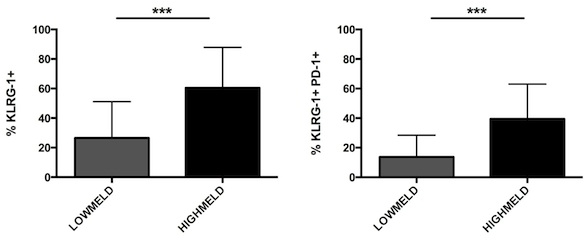Increased Frequency of Terminally Differentiated and Exhausted CD8+ T Cells Is Associated With Adverse Clinical Outcome After Mechanical Circulatory Support Device Implantation
1Medicine/Infectious Diseases, David Geffen School of Medicine at UCLA, Los Angeles, CA
2Pathology and Laboratory Medicine, David Geffen School of Medicine at UCLA, Los Angeles, CA
3Medicine/Cardiology, David Geffen School of Medicine at UCLA, Los Angeles, CA
4Cardiothoracic Surgery, David Geffen School of Medicine at UCLA, Los Angeles, CA.
Meeting: 2015 American Transplant Congress
Abstract number: D277
Keywords: Heart assist devices, Monitoring, T cells, Ventricular assist devices
Session Information
Session Name: Poster Session D: Late Breaking
Session Type: Poster Session
Date: Tuesday, May 5, 2015
Session Time: 5:30pm-6:30pm
 Presentation Time: 5:30pm-6:30pm
Presentation Time: 5:30pm-6:30pm
Location: Exhibit Hall E
Clinical outcomes vary after mechanical circulatory support device (MCSD) implantation, with some patients developing multi organ system dysfunction (MOD), sometimes leading to death. We hypothesized that increased frequency in terminally differentiated (TEMRA) and exhausted CD8+ T cells would be seen in patients with increased Model of End-Stage Liver Disease (MELD) score or death.
Methods: Peripheral blood mononuclear cells were isolated from 24 patients ages 25-81 pre- and post-MCSD placement. Immune phenotyping was performed by flow cytometry. Statistical analysis used linear regression for numeric variables and by Kruskal-Wallis test for categorical variables.
Results: Frequency of TEMRA cells significantly correlated with MELD (p=0.005) while frequency of naïve cells (CCR7+/CD45RA+) was inversely associated (p<0.001). Increased frequency of naïve CD8+ cells was associated with lower level of heart failure by INTERMACS score and younger patient age (both p<0.001). Increased frequency of the marker of exhaustion KLRG-1 was also associated with increased MELD score (p<0.001), and increased frequency of KLRG-1+ and programmed cell death (PD-1)+ T cells was associated with both MELD score (p<0.001) and death (p=0.022). Analysis of Sequential Organ Failure Assessment score as an alternate clinical marker showed similar findings.
Conclusion: Increase in T cell terminal differentiation and exhaustion is associated with increased MELD score and death after MCSD implantation, suggesting that immune dysfunction is part of the underlying mechanism leading to MOD. This data suggests the noninvasive monitoring of peripheral blood can be utilized to improve candidate selection and post-implant surveillance.

To cite this abstract in AMA style:
Schaenman J, Korin Y, Sidwell T, Sunga G, Bondar G, Wisniewski N, Kwon M, Cadeiras M, Deng M, Reed E. Increased Frequency of Terminally Differentiated and Exhausted CD8+ T Cells Is Associated With Adverse Clinical Outcome After Mechanical Circulatory Support Device Implantation [abstract]. Am J Transplant. 2015; 15 (suppl 3). https://atcmeetingabstracts.com/abstract/increased-frequency-of-terminally-differentiated-and-exhausted-cd8-t-cells-is-associated-with-adverse-clinical-outcome-after-mechanical-circulatory-support-device-implantation/. Accessed February 15, 2026.« Back to 2015 American Transplant Congress
